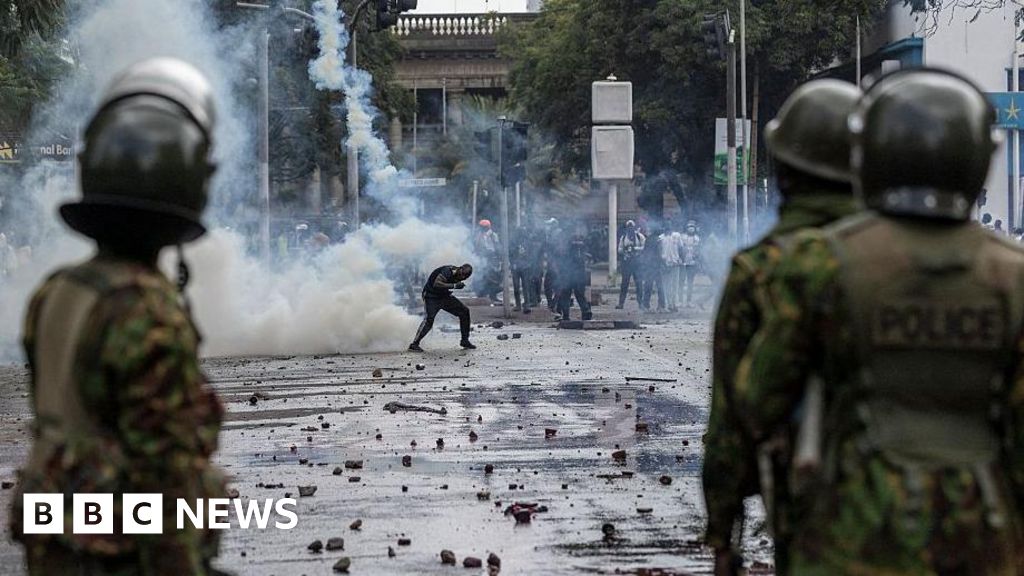Kenya protests are 'coup attempt', says minister

```html Kenya Protests: Minister Claims 'Coup Attempt' as Death Toll Mounts
Kenya's Interior Minister, Kipchumba Murkomen, has described recent protests as "terrorism disguised as dissent" and an "unconstitutional attempt" to overthrow the government, amid rising concerns over police brutality and the escalating death toll. At least 10 people have been confirmed dead, with rights groups claiming the figure is as high as 16, all allegedly from gunshot wounds. The protests, triggered by widespread anger over the rising cost of living and proposed tax hikes, have intensified calls for President William Ruto to resign.
The minister's remarks have sparked outrage among opposition leaders and human rights organizations, who accuse the government of downplaying the severity of the situation and attempting to suppress legitimate dissent. While Murkomen praised security forces for their "remarkable restraint," reports from the ground paint a different picture, with allegations of excessive force and indiscriminate shootings.
Mounting Casualties and Accusations of Police Brutality
According to the government, over 400 people were injured during Wednesday's protests, including approximately 300 police officers. However, Amnesty International and other human rights groups dispute these figures, citing evidence of a significantly higher number of civilian casualties. The death of 19-year-old David Mwangi, who was allegedly shot while picking up his younger brother, has become a symbol of the alleged police brutality. His mother, Rachael Nyambura Mwangi, told the BBC that her son was a bystander and had been shot in the head.
Another victim, 17-year-old student Dennis Njuguna, was shot dead in Molo. His mother, Jecinta Gathoni, expressed her grief and uncertainty about the circumstances surrounding his death, stating she did not know if he was part of the protests or a victim of a stray bullet.
Historical Context: Protests and Police Response in Kenya
Kenya has a history of protests, often met with a heavy-handed response from law enforcement. The post-election violence of 2007/2008, which left over 1,000 people dead, remains a stark reminder of the potential for political instability. More recently, the 2017 general election was also marred by protests and allegations of police brutality. "Kenya has a worrying trend of disproportionate use of force by police during protests," says Dr. Elias Omondi, a political analyst at the University of Nairobi. "This stems from a lack of accountability and a culture of impunity within the security forces. Reforms are needed to ensure that protests are managed in accordance with international human rights standards."
Government Response and Media Crackdown
The government's initial response to the protests included a ban on live TV and radio coverage, a move that was swiftly overturned by the Nairobi High Court. This attempt to control the narrative has further fueled public anger and raised concerns about freedom of expression. The Law Society of Kenya condemned the "unnecessary aggression and brute force" used by security officers, calling for an independent investigation into the deaths and injuries.
Economic Grievances Fueling Unrest
At the heart of the protests are deep-seated economic grievances. President Ruto's administration has implemented a series of tax hikes aimed at reducing the country's debt burden and boosting revenue. However, these measures have been met with widespread opposition, with many Kenyans struggling to cope with the rising cost of living. "The government's austerity measures are disproportionately affecting the poor and vulnerable," explains economist Anjali Sharma. "While fiscal responsibility is important, it should not come at the expense of social welfare and basic necessities. There is a need for more equitable distribution of the tax burden."
Proposed tax increases include a controversial housing levy and higher taxes on fuel. Many Kenyans feel the government is not addressing corruption effectively. Youth unemployment remains a significant challenge.
Looking Ahead: Calls for Dialogue and Reform
The current situation in Kenya is volatile, with the potential for further escalation. Opposition leaders have called for peaceful protests to continue, while urging the government to engage in meaningful dialogue to address the underlying issues. Civil society organizations are demanding accountability for police brutality and comprehensive reforms to ensure that future protests are handled in a more humane and rights-respecting manner. The international community is also closely monitoring the situation, with calls for restraint and respect for human rights.
The challenge for President Ruto's government is to find a way to address the legitimate grievances of the Kenyan people while maintaining law and order. Failure to do so risks further instability and could undermine the country's democratic institutions. ```
Originally sourced from: BBC News Africa
